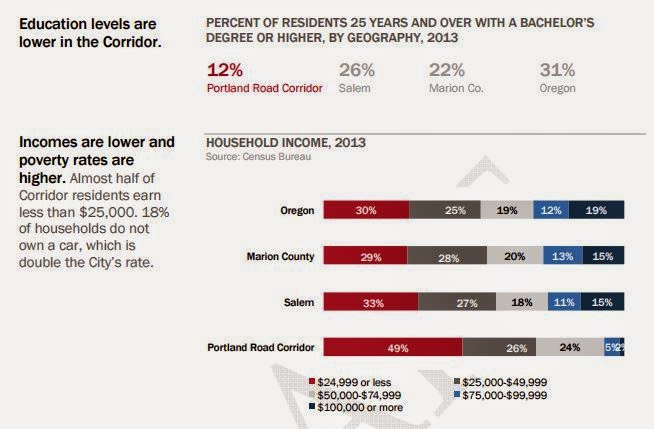The title is "PORTLAND ROAD CORRIDOR - OPPORTUNITIES AND NEEDS ANALYSIS OUTLINE" and it is in the meeting packet here.
In no small part because it concerns a smaller area than the citywide jobs and housing study, the EOA-HNA, it's more specific and, consequently, more interesting.
But first, though, if there's one overwhelming impression, it is this: Since there's already city infrastructure and all this undertutilized industrial land along Portland Road, why are we screwing around with the undeveloped Mill Creek parcel and our "Renewable Energy and Technology Center" instead of redeveloping along the Portland Road corridor?
Maybe there are good reasons, but from a glance it seems like they boil down to "shiny! new!" And shiny and new is almost always less sustainable than recycling.
 |
| Should this be the priority? |
 |
| How is this more sustainable than redeveloping existing land? |
 |
| Drought on the Front Page |
 |
| Are we facing the prospect of a mega-drought? |
(It's also probably true that our water is too cheap, that we would use it more efficiently if there were better pricing signals, but folks don't seem ready for this.*)
Anyway, there's useful demographic, employment, and retail information about the Portland Road corridor in the report, generally baselined to citywide numbers.
 |
| Younger and Latino |
 |
| Poorer |
 |
| Surprisingly, lots of government jobs here |
 |
| Industry is also important |
 |
| There are retail opportunities |
 |
| We need to figure out how to get housing more centrally located. Note county land, too. |
(Maybe you live nearby and know more about the ground-level conditions? Chime in!)
The North Gateway Redevelopment Advisory Board meets Thursday the 2nd at 8:00 AM in the Center 50+, Classroom A, 2615 Portland Road NE.
* In a recent piece on John Stuart Mill and libertarian hero Friedrich Hayek:
[Hayek] argued that central planning is bound to fail, even if the planners are well motivated, because they cannot possibly assemble the information that is ultimately incorporated in the price system. Hayek described that system as a “marvel,” because it registers the knowledge, the preferences, and the values of countless people. Hayek used this insight as the foundation for a series of works on freedom and liberalism. Committed to free markets and deeply skeptical of the idea of “social justice,” he is a far more polarizing figure than Mill, beloved on the political right but regarded with ambivalence by many others....Better students of economic theory will have more to say, but our problems with parking, with water, with traffic congestion, with carbon and climate change, all have as a fundamental ingredient a market failure where costs are externalized and need to be recaptured and internalized back in the pricing. Such a price system will almost certainly lead to better outcomes. Free or cheap seems on the surface to be more just - and yet because of multiple instances of a "tragedy of the commons" we're all overusing certain resources and piling up deferred and externalized costs, some of which promise catastrophe. Folks on the bottom and on fixed incomes need to be protected from the ravages of free-market orthodoxy, which is not a utopian panacea. At the same time, a lot of our market failures could be addressed with a robust dose of better pricing and freer-markets.The solution is rarely obvious - but whatever it is we're doing now isn't working.
[By contrast] Mill cared deeply about social justice, and he came to embrace what he described as a form of socialism, above all because of the unfairness of “the present economic order of society.” But his complex writing on that topic should hardly be seen as an endorsement of centralized government planning. Mill was never a rationalist in Hayek’s pejorative sense.


1 comment:
I was told by a reliable source that Catholic Community Services wanted to make a major investment in the Portland Road area with services and housing. They were told by the City that they did not want that type of development in the area. Can't understand why the City would reject an offer to provided much needed development.
Maybe like on Center Street and Mission Street the mayor has some 'big plans' for a major out-of-town investor.
I hope that the people in the area get a voice.
As for Mill Creek Industrial Park, that is a real head scratcher to me. And they destroyed wetlands for nothing too!
Post a Comment